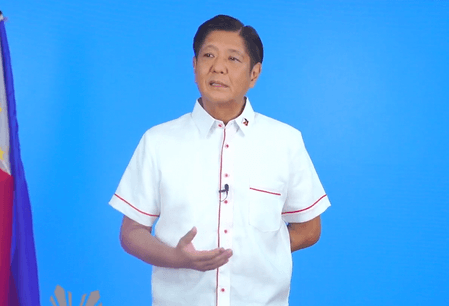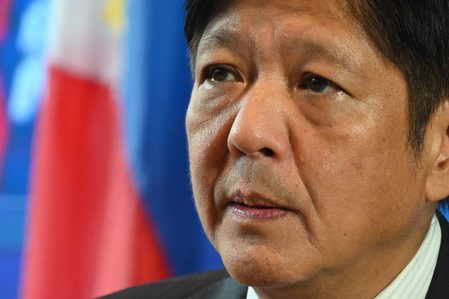SUMMARY
This is AI generated summarization, which may have errors. For context, always refer to the full article.
![[Just Saying] Should we give the benefit of the doubt to Marcos Jr. as incoming President?](https://www.rappler.com/tachyon/2022/05/Should-we-give-the-benefit-of-the-doubt-to-Ferdinand-Bongbong-Marcos-Jr-as-the-incoming-President-2.jpg)
An election is one of the great processes in a democracy. However, elections do not necessarily guarantee an upright government. It will only be as good or bad, as truthful or deceptive, as competent or inefficient, as the people who helm it. An administration democratically ushered into power rests its legitimacy on the backs of the true sovereign — the people. As our Constitution puts it, “public service is a public trust.” There is no room for private interests to reign here.
No less than absolute honesty and fitting humility are needed from our public servants. If citizens say they do not trust their government, the burden is on these officials to earn that trust. It cannot be the other way around. Public officials cannot beat their chest and turn up their noses at the masses. They are not better than us. They must be accountable to the last centavo and must live modest lives.
With the panoply of power at the hands of the administration’s officials and the potential of it being arbitrarily unleashed against citizens whom they are supposed to serve and protect, no criticism is so threatening, no commentary so annoying, no inconvenience so discomforting against any public servant if only to inform the public of a committed, ongoing, or impending misdeed. A citizen’s legitimate criticism, though laced with unsavory words, sharp and distasteful, must be respected, tolerated, and safeguarded at all times. This aspect is another pillar of democracy. Public officials must bear the unpleasantness for their own good and for the vibrancy of democracy to continue. As the Supreme Court said, leaders are “property of the public.” An administration that is “onion-skinned,” dumb, or unprincipled is highly susceptible to the commission of the greatest abuse imaginable.
That is the reason why the bill of rights of the Constitution provides for the right of the people to petition the government for redress of grievance. It is sacrosanct. Any statement of the powers-that-be insinuating a threat to those who speak their minds against the government or its administrators in relation to their policies and historical connections smacks of autocracy. The people must be vigilant.
At the dawn of this new administration, all eyes turn now to Ferdinand “Bongbong” Marcos Jr., and to whether or not he will be what people expect him to be. On one end are the 31 million or so voters who have pinned their hopes on the unity he has repeated ad infinitum during the campaign season. On the other, 14 million (or even more) who have not, and who are wary to say the least, of what his presidency brings. Both sides have ideas about who he could be, both are now waiting to see who he really is.
I am less inclined though to believe that we do not already know what we need to know about him. There will be no honeymoon stage in his term as far as I am concerned. This is not to be antagonistic nor bitter. It is simply an honest assessment given the undeniable realities of his past.
By final judgment of a court of law, he was convicted of a crime. A president with such a criminal record is a first in Philippine history. The lingering issue of the non-payment of taxes still exists.
He, among others, resisted the legitimate claim of the government to recover ill-gotten wealth declared as such by the Supreme Court in Republic of the Philippines vs. Sandiganbayan et al (G.R. No. 152154, July 15, 2003).
Many believe that his assumption of the presidency brings back to power a family which has, as read in jurisprudence, claimed ill-gotten wealth. In fact, an entire government entity — the Presidential Commission on Good Government (PCGG) — had to be created in order to find and retrieve said wealth. In the case of Republic v. Sandiganabayan, the ill-gotten wealth was estimated to be at $658,175,373.60 as of January 31, 2002. The same case adjudicated the huge amount of money forfeited in favor of the Republic of the Philippines.
Significantly, the PCGG was principally created for the “recovery of all ill-gotten wealth accumulated by former President Ferdinand E. Marcos, his immediate family, relatives, subordinates, and close associates, whether located in the Philippines or abroad (Executive Order No. 1 Series of 1986).” Against strong resistance, the Republic was able to recover money and properties worth in the millions, if not billions of pesos. It is of little surprise therefore that a good segment of the population, perhaps not the majority, but a considerable lot, doubt that he has any capacity for integrity and principled leadership. A legitimate question can be raised: what motivation is there really to give anything back? Will he really be better, or any different, than his father and namesake, the dictator, Ferdinand Marcos Sr.?
His father as a dictator and his regime as a dictatorship are characterizations of no less than the Supreme Court in Marcos vs. Manglapus (G.R. No. 88211 September 15, 1989) and in Philippine Coconut Producers Corporation et al vs. PCGG ( G.R. No. 75713 October 2, 1989) respectively. They are institutional recognitions – historical facts that cannot be subjected to revision.
Speaking of the dictator, this shadow looms over Bongbong’s presidency, whether he likes it or not. Contrary to the wave of disinformation now infecting social media, the Martial Law era was no golden age. It was bloody and violent. So notorious were the atrocities during that time that a law was enacted honoring the heroism of those we lost into our collective narrative as a Filipino People. Republic Act No. 10368 declares it state policy “to recognize the heroism and sacrifices of all Filipinos who were victims of summary execution, torture, enforced, or involuntary disappearance and other gross human rights violations committed during the regime of former President Ferdinand E. Marcos covering the period from September 21, 1972 to February 25, 1986 and restore the victims’ honor and dignity.”
Perhaps this law may mean very little to those in power now or in the future, but it is a standing testament to the horrors visited upon the country during Ferdinand Marcos Sr.’s dictatorship. While Ferdinand “Bongbong” Marcos Jr.’s supporters may point out that we should not judge him based on the heinous events described in the law, any refusal to expressly and unequivocally admit the most basic truth about these events — that they were unforgivable crimes — is a damning indictment in and of itself. I will not be surprised if some imagine the possibility that he may even take inspiration from them, a chilling proposition.
Bongbong Marcos may begin his term with a 31 million-strong mandate, but I believe he also starts it without any moral ascendancy. His challenge is two-fold. To his supporters, he bears the burden of rising to the lionized vision of himself that he has allowed his machinery to create in their minds and hearts. To everyone else, he faces the challenge of recreating himself as an acceptable public official — a politician distanced from the Martial Law mythos of his father, unquestionably willing to abide by the law, dedicated to rectifying the misdoings – as evidenced by jurisprudence – involving him, his family, and their cohorts, and unyieldingly loyal to the letter and spirit of the 1987 Constitution, as all presidents should be.
Whether he will even be willing to rise to these challenges is another question all together. He may be all too happy to sit back and run this country to the ground, enjoying all the luxuries of power and privilege the presidency provides. Or he may truly be a transformed brilliant leader learning from his and, more importantly, the nation’s historical past. While we all have our guesses, the reality now is that only time will tell. As to whether we skeptics should give him the benefit of the doubt? I think it can wait until there are more signs that he actually deserves it. For a man whose life has enjoyed enormous entitlements, deserved or undeserved, it should be a while before we give him anything else. – Rappler.com
Mel Sta Maria is dean of the Far Eastern University (FEU) Institute of Law. He teaches law at FEU and the Ateneo School of Law, hosts shows on both radio and Youtube, and has authored several books on law, politics, and current events.
Add a comment
How does this make you feel?


There are no comments yet. Add your comment to start the conversation.